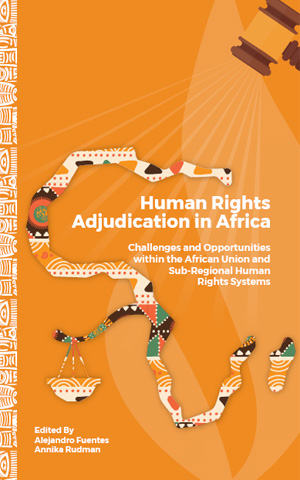Human rights adjudication in Africa: Challenges and opportunities within the African Union and sub-regional human rights systems
Edited by Alejandro Fuentes and Annika Rudman
2024
ISBN: 978-1-7764485-0-0
Pages: 295
Print version: Available
Electronic version: Free PDF available
About the publication
The collection of chapters contained in this book originates from the first Raoul Wallenberg Institute Regional Africa Academic Network Conference held at the University of Zimbabwe, Harare, Zimbabwe in October 2022. The main aim of this book is to advance an understanding of the way Africa regional and sub-regional human rights systems contribute to access to justice on the continent and to generate further knowledge about the institutions that make up the African human rights adjudication system, the African Court on Human and Peoples’ Rights, the African Commission on Human and Peoples’ Rights, the African Committee of Experts on the Rights and Welfare of the Child and sub-regional courts, such as the Economic Community of West African States Community Court of Justice.
Table of Contents
Acknowledgments
Contributors
1 Tracing the developing reparations jurisprudence of African Court on Human and Peoples’ Rights as reflected in its first cases of Mtikila, Zongo and Konate
Tarisai Mutangi
1 Introduction
2 Reparations in the African human rights system
3 The reparations practice in the African Court
4 The African Court’s reparations framework
5 Conclusion
2 The ultimate withdrawal: A critical analysis of the jurisprudence of the African Court on Human and Peoples’ Rights
Derick de Klerk & Annika Rudman
1 Introduction
2 Resisting the authority of the African Court
3 Tanzania’s withdrawal
4 Benin’s withdrawal
5 Conclusion
3 The law and politics of access to the ECOWAS Court in human rights cases
Christopher Nyinevi & Apraku Nketiah
1 Introduction
2 The unique human rights mandate of the ECOWAS Court
3 Critical evaluation of the policy of unrestricted access
4 Resistance to the policy of unrestricted access
5 Evaluation of the proposed Supplementary Rules on the Human Rights Practice of the ECOWAS Court
4 Rape as manifestation of gender-based discrimination: An exploration of state responsibility for sexual and gender-based violence in the jurisprudence of the ECOWAS Community Court of Justice
Annika Rudman
1 Introduction
2 The substantive and transformative nature of equality under the Maputo Protocol
3 Rape as an act of gender-based discrimination
4 Rape as a violation of the Maputo Protocol
5 State responsibility for rape as a violation of the rights to dignity and freedom from cruel, inhuman or degrading treatment
6 Conclusion
5 A critical analysis of resocialisation as an obligation, right and remedy under the Maputo Protocol in the jurisprudence of the African Court on Human and Peoples’ Rights and the ECOWAS Court of Justice
Anisa Mahmoudi & Annika Rudman
1 Introduction
2 Objectives of resocialisation
3 Competing rights
4 The CEDAW Committee on resocialisation
5 The African regional legislative framework
6 Conclusion
6 Africa is ageing: Prospects in the implementation of the Protocol on the Rights of Older Persons in Africa
Faith Kabata
1 Introduction
2 Protocol to the African Charter on Rights of Older Persons in Africa: Substance and implications
3 Regional protection of the rights of older persons
4 Analysis of the normative provisions of the judicial decisions
5 Conclusion
7 ‘Fortune’ as a ground of discrimination under the African Charter on Human and Peoples’ Rights
Gideon Basson
1 Introduction
2 A teleological interpretation of fortune
3 Towards an ‘African’ substantive equality
4 Discrimination based on ‘fortune’ within a reconsidered African conception of substantive equality established through a teleological interpretation
5 Conclusion
8 Comparative jurisprudential developments and adjudication of indigenous peoples’ rights. Integration of international human rights law in the Americas and Africa
Alejandro Fuentes
1 Introduction
2 Recognition of the right to communal property over indigenous peoples’ traditional lands in the Americas
3 Recognition of the indigenous peoples’ right to property over traditional lands in the African human rights system
4 Concluding remarks
